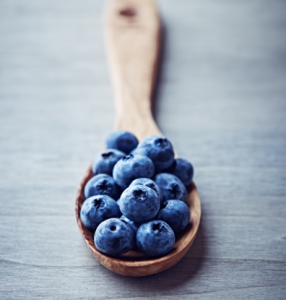Consumers love to sing the blues
Consumers love blueberries, and the industry is only too happy to support this love affair.
A 2014 study commissioned by the U.S. Highbush Blueberry Commission provides a detailed explanation about the exploding growth of the blueberry industry.
“As consumer interest in healthy dining options continues to rise, so does the presence of fruit on U.S. menus, and new research from Technomic shows blueberries — a fruit renowned for its nutritional profile — gaining major traction among the top 500 chain restaurants,” the commission stated.
“Overall blueberry mentions on American menus have increased 97 percent since 2007 — a stronger growth rate than that of strawberries, raspberries or blackberries — with fresh blueberry mentions up more than 176 percent in the same time period.”
This growth was attributed to changing consumer preferences and “an evolution in the way foodservice professionals view blueberries,” the commission commented.
“Today’s consumers see blueberries as one of the little choices they can make in pursuit of a healthy lifestyle, and savvy restaurants are picking up on that,” said Mark Villata, executive director of the commission. “Our research shows that the health halo affiliated with blueberries extends all the way to dining establishments that feature them — so, restaurants looking to capture consumers’ interests should consider adding more blueberry options to their menus.”
Blueberries are being incorporated into offerings such as non-alcoholic beverages and smoothies, entrees including salads and dessert dishes. “As smoothie fever sweeps the nation, many chain restaurants have begun offering blueberry as a flavor that appeals to customers, particularly younger millenials,” the commission noted.
Snacking habits have been expanded to include consumption of fresh fruit. “By providing a variety of snack options featuring fruit, restaurants can position themselves to increase traffic and sales — particularly among a younger customer base,” the report noted.
A nationwide survey conducted by the commission in 2013 noted that new research shows strides made since 2004 are guiding future marketing strategies. “New research from the U.S. Highbush Blueberry Council shows Americans are nearly twice as likely as they were nine years ago to buy blueberries in the coming year, and the number of households saying they’ve purchased blueberries within the past month (69 percent) has nearly doubled since 2008. In alignment with the industry’s goals of continuing to grow consumption, today’s blueberry consumers are also trending younger and more diverse; they’re more likely to be 35- to 44-year-olds (often parents with kids at home) and minorities than they were in 2004.
“With the mom market representing $2.7 trillion in annual spending in the U.S. and the Hispanic market expected to hit $1.5 trillion in buying power by 2015, this shift represents a step in the right direction for the blueberry industry,” said Parm Bains, commission chairman.
Alex Ott, executive director of the California Blueberry Commission, told The Produce News, “Those trends are absolutely correct.” California is the nation’s sixth-largest producer of blueberries, and the season is in full swing. “Our peak is just around the corner,” he stated. California’s production will be roughly 55 million pounds, a crop that is 10 percent larger than 2014. California’s harvest is running approximately 10 days ahead of typical timetables.
According to Ott, the industry continues to research new blueberry varieties that will result in higher bush yields and at the same time require less irrigation.
As production levels increase to meet market demand, Ott said California’s producers continue to explore export opportunities to move blues. Three key emerging markets are South Korea, China and Australia.
05/14/2015
The Produce News






